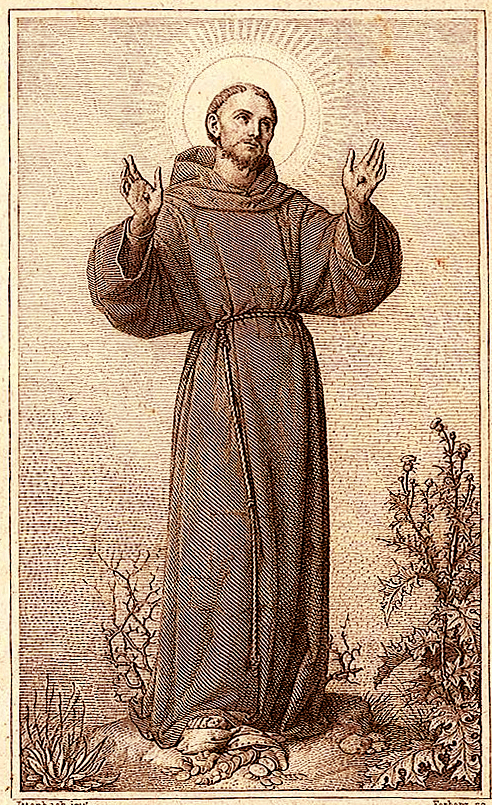
Saint Francis [1181-1226] was born in Assisi, Italy. His father was a wealthy cloth merchant. While his father was in France on business, Francis’ mother had him baptized and named him after John the Baptist. She was hoping that he would devote his life to religion. When his father returned to Assisi, he was furious about the baptism and name giving. He didn’t want his son to be a man of the Church, and called his son Francesco [Francis] in honor of his trade with the French, which was very lucrative.
As a youth, Francis did well in his studies, and was planning to become a “Troubadour,” – a poet-musician who composed and sang songs of chivalry and love in the royal courts of Europe. In his youth he lived a lavish lifestyle, with rich friends, fine clothes and expensive tastes. However, he became disillusioned with his extravagant but empty lifestyle, and felt attraction to a life of renunciation. He was moved by compassion for the suffering of humanity . One day when he was selling his father’s cloth in the marketplace, he gave the entire days profits to a beggar who asked him for charity. When he arrived home, his father was furious and scolded Francis.
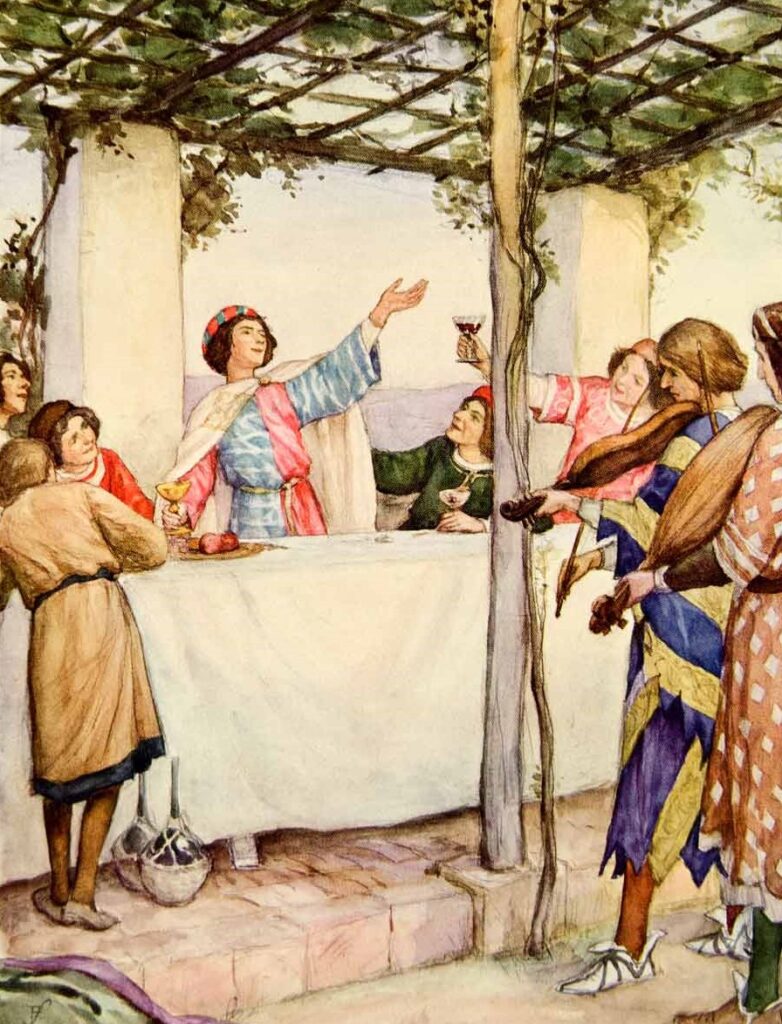
In 1201, aged around twenty, Francis joined a military expedition against a rival Italian city, and was taken captive. He spent a year in a dank prison cell before his father paid a ransom for his release. On his return to Assisi in 1203, Francis returned to his previous life of pleasure, until in 1204 he became seriously ill, and his suffering caused him to question life’s meaning. In 1205 he planned to enlist in the army of the Count of Brienne, but on his way, Francis had a vision of Christ and was guided to return to Assisi.
From this time on, Francis gave up his hedonistic lifestyle, avoiding the partying and feasting of his former companions. When jokingly asked whether he was planning to marry, he answered, “Yes, to a fairer bride than any of you have ever seen.” He was referring to “Lady Poverty,” a term he used to describe the life of renunciation he later adopted. He now spent much of his time praying in isolated places, asking God for enlightenment, as well as nursing lepers in the charity houses near Assisi.
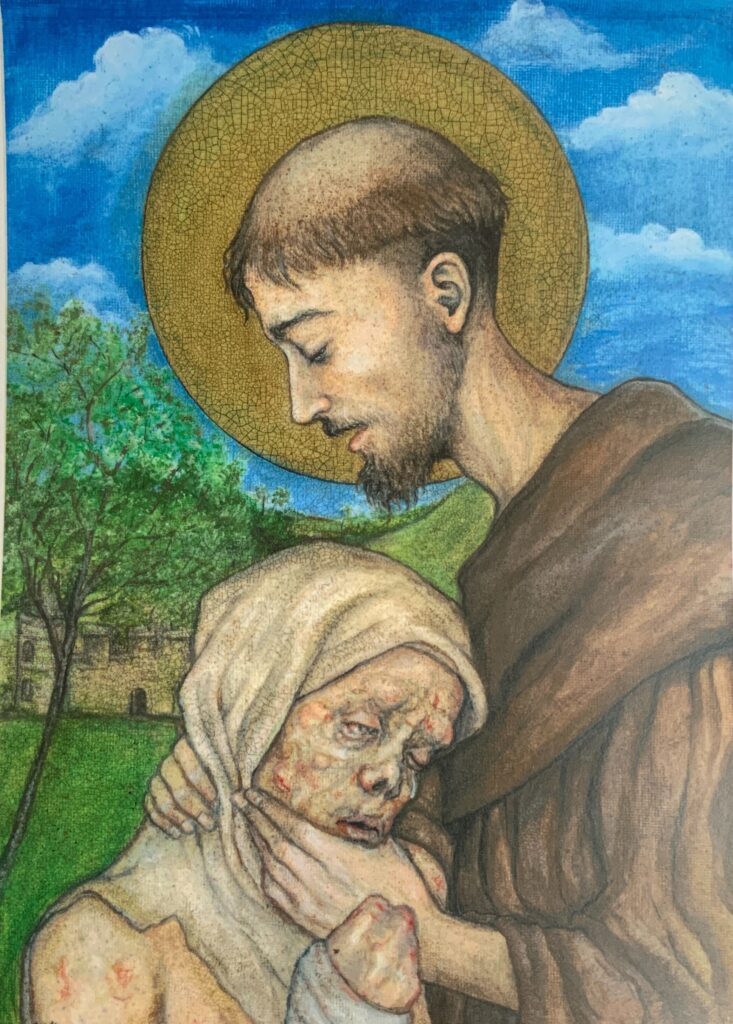
On a pilgrimage to Rome, Francis joined poor folks who were begging at the doors of the churches. He saw cardinals and bishops dressed in opulent clothes and eating sumptuous meals, while the poor and destitute were dressed in rags and forbidden from entering their fine Cathedrals. On his return to Assisi, Francis had a mystical vision in a country chapel, in which the Icon of Christ said to him, “Francis, Francis, go and repair My house which, as you can see, is falling into ruins.”
At first, Francis interpreted this to mean that he should fix the ruined church in which he was praying. For this purpose, he sold his horse and some of his father’s cloth and gave the proceeds to the church’s priest. However, Francis later realized that this command of Lord Jesus Christ referred not to just that one chapel. He was being asked to fix the entire Christian Church, which had become very corrupt, being largely run by debauched and worldly minded leaders.
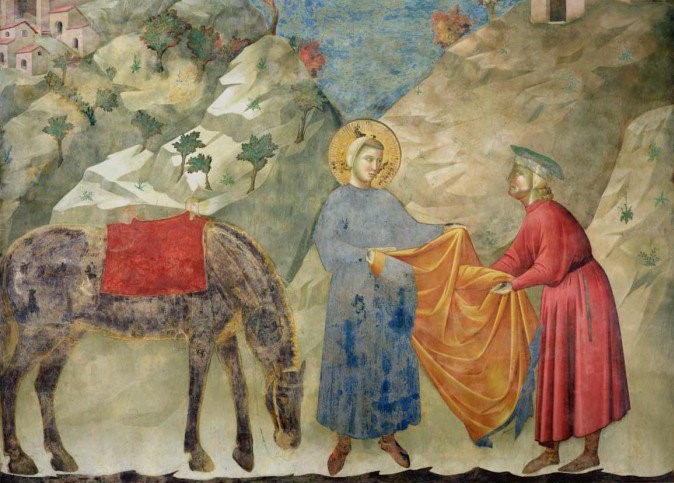
Francis’ father became enraged upon discovering that his son had sold his cloth to fund the restoration of a crumbling country chapel. Distraught that his son had become so unworldly – and at his expense – he attempted to change Francis’ views with threats and beatings. When this failed, he took legal proceedings against Francis. In the presence of the bishop, Francis renounced his father and his rights to inheritance. In an act of extreme renunciation, he returned to his father the garments he had given him, and stood naked before the bishop and all onlookers. In the coming months he lived as a beggar in Assisi.
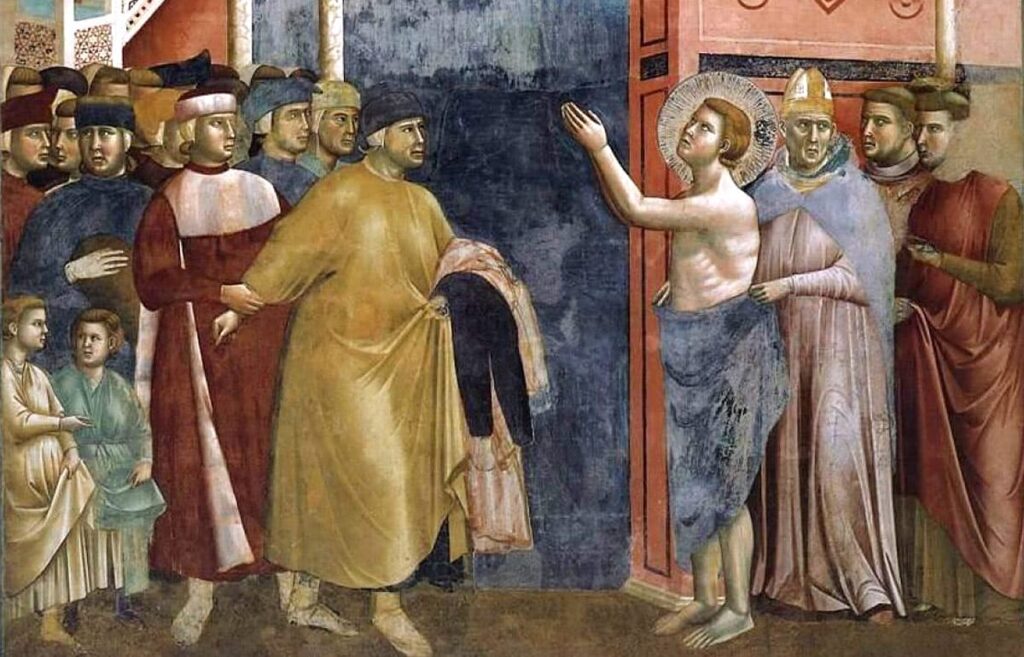
He returned to the countryside around Assisi and for two years he restored a number of ruined chapels. Among these was the little chapel of St. Mary of the Angels, which was later to become his favorite residence. Then in 1209, Francis heard a sermon that changed his life forever. The sermon was from Matthew 10:9, in which Christ told his followers they should go forth and proclaim that the Kingdom of Heaven was at hand, that they should take no money with them, nor even a walking stick or shoes for the road. Hearing Christ’s words inspired Francis to devote himself to a life of worship and poverty.
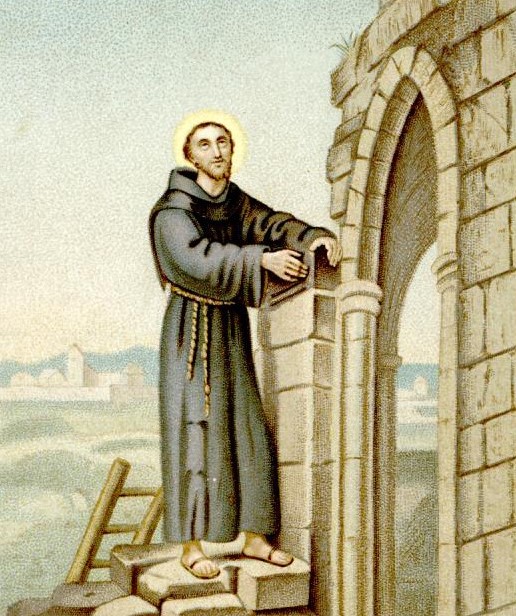
In his youth Francis, as the son of a wealthy cloth merchant, wore expensive brocades and fine silks. He now wore the plainest of rough clothing, without shoes and without a staff or scrip – a medieval alms-bag used to carry food and money. Francis began to preach in the name of Christ. This was at a time when the leaders of the Christian Church were political figures who were wealthy and extremely corrupt and materialistic. The cardinals, bishops and priests feasted on meat and wine, wearing fine clothes and valuable jewels. Meanwhile, many of the poor peasants starved and lived in extreme poverty. Because of their ragged appearance, the poor were not allowed to spoil the splendor of the large churches and cathedrals.
Francis was soon joined by a wealthy townsman and jurist named Bernardo di Quintavalle. Within a year, he had eleven followers. Francis chose to never to be ordained a priest, and the community were known as the “Friars Minor” or “Franciscan Order,” living as “lesser brothers” of the Church. They lived a simple life in what had once been the leper house of Rivo Torto near Assisi. They spent much of their time wandering through the mountainous regions of Umbria. Francis and his brethren were said to always be cheerful and full of song, making a deep impression on whoever they met with their earnest devotion, compassion and simple-hearted sincerity.
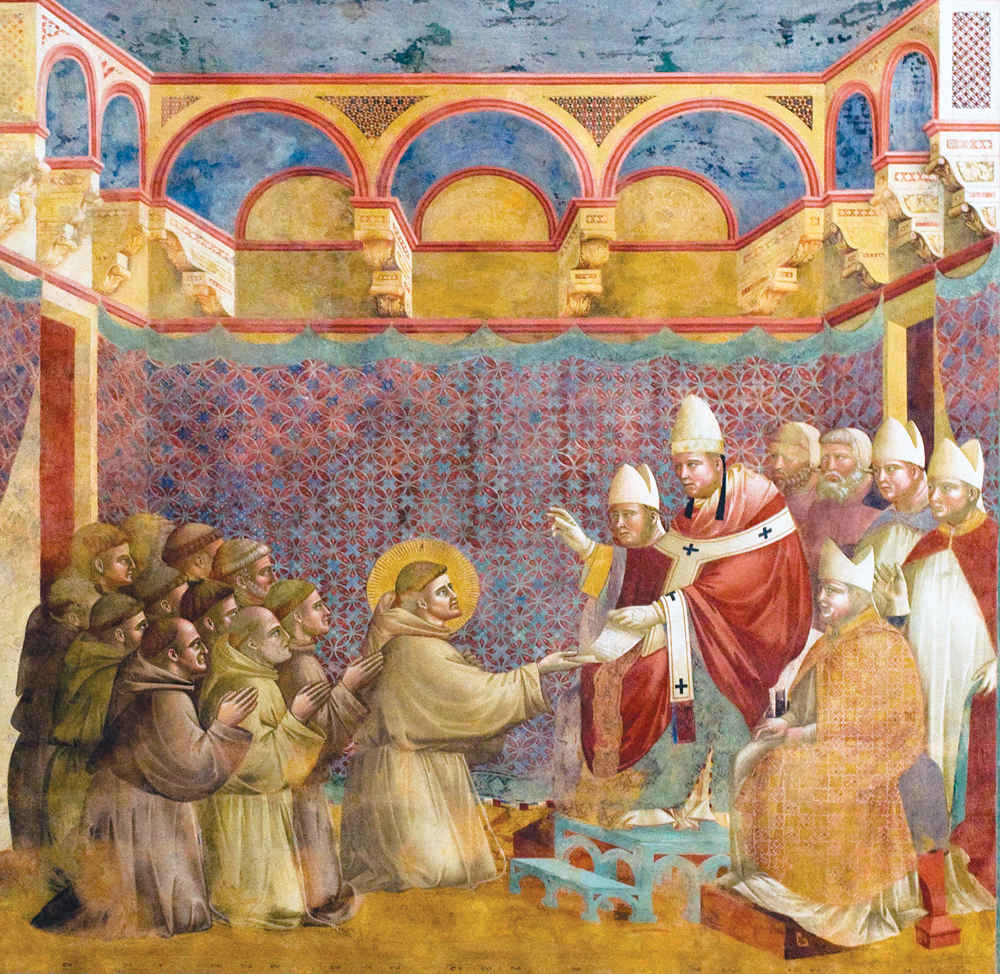
In 1209 Francis and his eleven followers journeyed to Rome. They hoped to gain permission from Pope Innocent III to found a new religious order. At first the Pope refused to see him. However, the following night, Pope Innocent had a dream in which he saw a poor man holding up a crumbling church. On awakening, he realized the poor man in his dream was the man he refused to see the previous day. Pope Innocent III reversed his decision and granted Francis an audience. He was so moved by Francis’ earnest sincerity and conviction, that he recognized the newly formed order of monks. From that point on, the Franciscan order grew quickly.
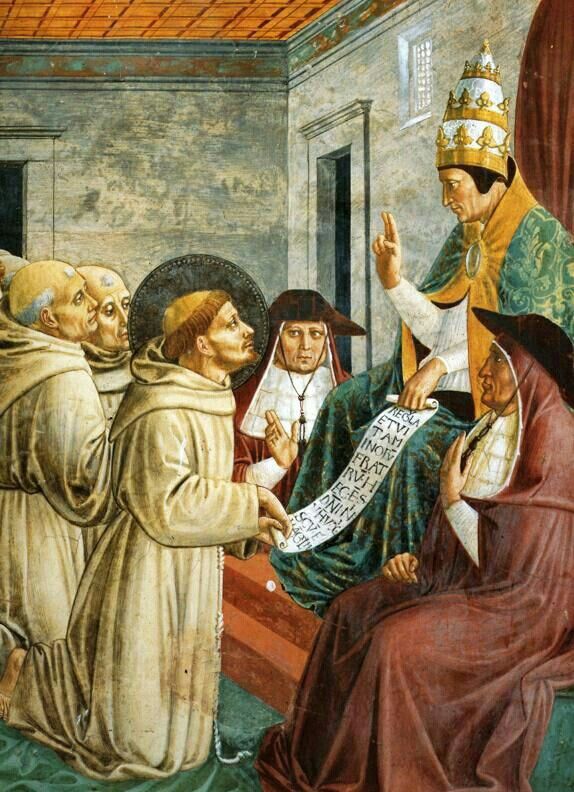
In 1213 Francis was gifted the mountain of La Verna by the count Orlando di Chiusi, who described it as “eminently suitable for whoever wishes to do penance in a place remote from mankind.” The mountain became one of Francis’s favorite retreats for prayer. In time, several noblemen and some well-educated men joined his order. One of these men, Tommaso da Celano, later wrote a biography of St. Francis. In 1217 the growing congregation of friars was divided into provinces, and groups were sent to France, Germany, Hungary, Spain, and to the East.
In 1219, during the time of the Crusades, Francis and a few of his companions went on a non-violence pilgrimage to Egypt. Francis crossed the lines between the Muslim sultan and the Crusaders in Damietta, a major port city in Egypt. He was received by the sultan Melek-al-Kamil. Francis challenged the Muslim scholars to a test of true religion by fire. Francis offered to enter the fire first, but the Muslim scholars declined. He proposed that if he left the fire unharmed, the sultan would have to recognize Christ as a true representative of God.
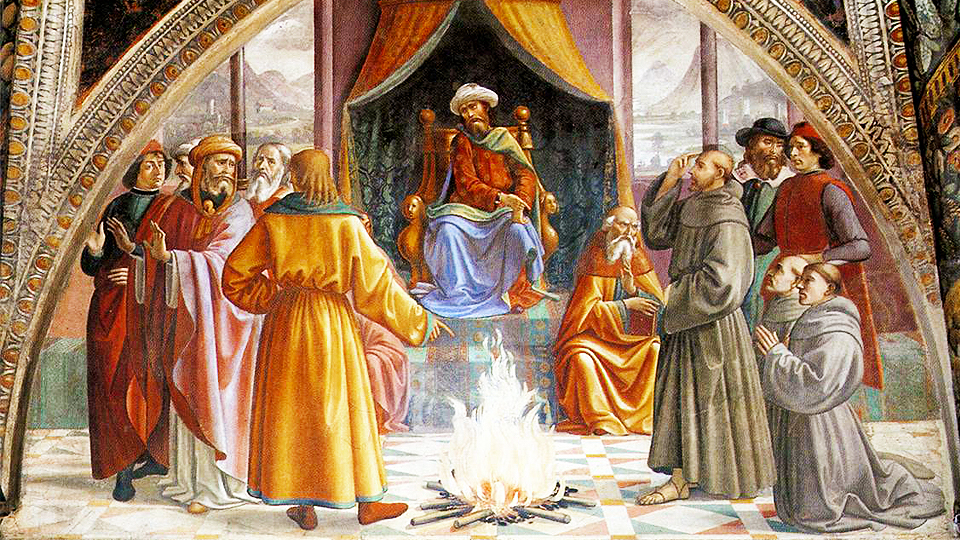
The sultan was so impressed with Francis’ faith, that he allowed him to preach to his subjects. Though Francis didn’t succeed in converting the sultan, according to Jacques de Vitry, bishop of Acre, it is evident by the sultan’s parting words that he was deeply impressed with Francis. The bishop recorded that the parting words of the sultan to Francis were, “Pray for me, so that God may agree to reveal to me the law and faith which is most pleasing to him.”
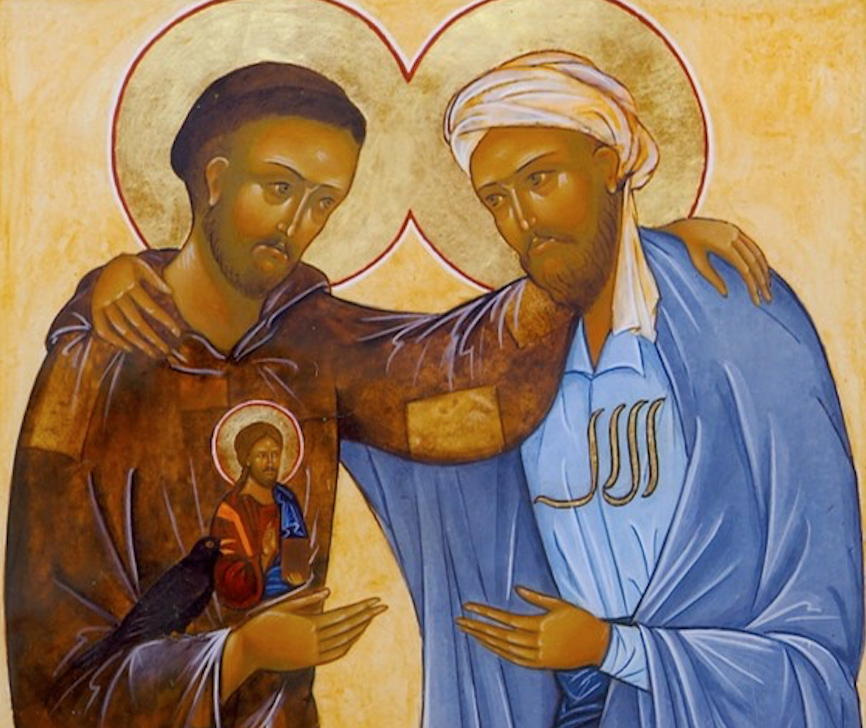
In 1220 Francis spent time in Acre – the capital of the then shrinking Crusader Kingdom of Jerusalem – and is thought to have visited the holy places in Palestine. Acre was the last major stronghold of the Crusader Kingdom of Jerusalem. It was besieged in 1291, and with Acre’s fall, the Crusaders lost control in the Holy Lands. Francis’ visit to Egypt and attempted reconciliation with the Muslim world had far-reaching consequences, long past his own death. After the fall of the Crusader Kingdom, the Franciscans were allowed to stay on in the Holy Land, and were appointed as “Custodians of the Holy Land” on behalf of Christianity.
The Passing of St. Francis
During the last years of his relatively short life – he died at 45 – Francis was half blind and seriously ill. Two years before his death he was said to have received the stigmata, the painful wounds of Christ in his hands, feet and side. St. Francis, on his deathbed, thanked his donkey for carrying and helping him throughout his life, and his donkey wept. On the eve of his death, the saint, following the example of his Divine Master, had bread brought to him and broken. This he distributed among those present, blessing Bernard of Quintaville, his first companion, Elias, his vicar, and all the others in order.
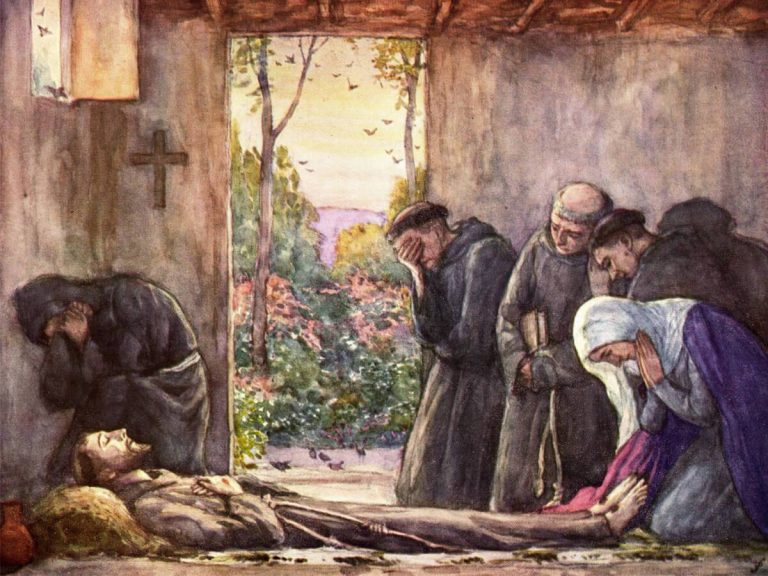
Francis said to them, “I have done my part. May Christ teach you to do yours.” Then, in a final act of detachment to show he had completely renounced the world, Francis removed his habit and lay down on the bare ground, covered with a borrowed cloth. He rejoiced that he was able to keep faith with Lady Poverty to the very end. On his deathbed, Francis said over and over again “Be praised, O Lord, for our Sister Death,” quoting a recent addition to his “Canticle of the Sun.”
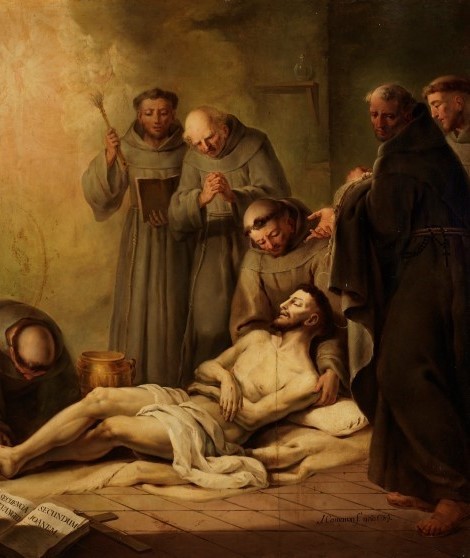
He asked to have read to him the Passion according to Saint John, and then in faltering tones he himself recited Psalm 141. Attributed to King David, this psalm is described as a prayer for safekeeping from wickedness:
Lord, I cry out to You;
Make haste to me!
Give ear to my voice when I cry out to You.
Let my prayer be set before You as incense,
The lifting up of my hands as the evening sacrifice.Set a guard, O Lord, over my mouth;
Keep watch over the door of my lips.
Do not incline my heart to any evil thing,
To practice wicked works
With men who work iniquity;
And do not let me eat of their delicacies.Let the righteous strike me;
It shall be a kindness.
And let him rebuke me;
It shall be as excellent oil;
Let my head not refuse it.For still my prayer is against the deeds of the wicked.
Their judges are overthrown by the sides of the cliff,
And they hear my words, for they are sweet.
Our bones are scattered at the mouth of the grave,
As when one ploughs and breaks up the earth.But my eyes are upon You, O God the Lord;
In You I take refuge;
Do not leave my soul destitute.
Keep me from the snares they have laid for me,
And from the traps of the workers of iniquity.
Let the wicked fall into their own nets,
While I escape safely.
At the concluding verse, Francis was led away from earth by “Sister Death.” On October 3 1226, St. Francis left his body, aged forty-five years. Brother Elias reported that at Francis’ death “his appearance was one of great beauty gleaming with a dazzling whiteness and giving joy to all who looked upon him.”
Final Verses of Canticle of the Sun
Be praised, my Lord, through those who forgive for love of you;
through those who endure sickness and trial.Happy those who endure in peace,
for by you, Most High, they will be crowned.Be praised, my Lord, through our Sister Bodily Death,
from whose embrace no living person can escape.
Woe to those who die in mortal sin!
Happy those she finds doing your most holy will.
The second death can do no harm to them.Praise and bless my Lord, and give thanks,
and serve him with great humility.
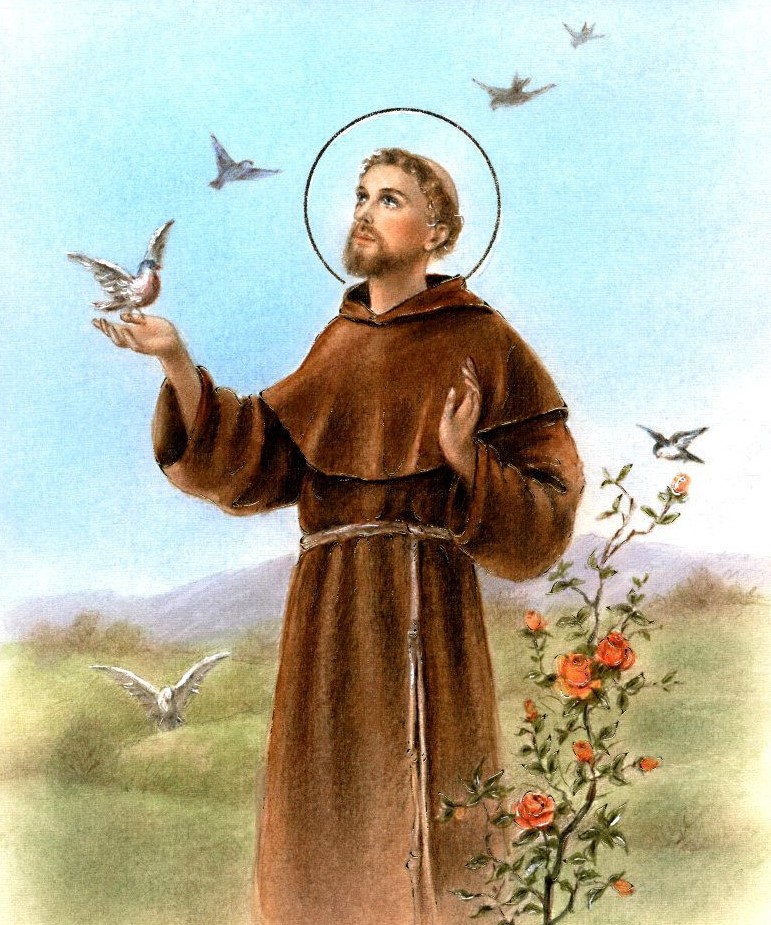
St. Francis’s Perception of Souls Within all Creatures
As a result of his advanced spiritual realization, St. Francis of Assisi perceived the soul or life force within the bodies of other living entities and recognized the spiritual brotherhood of all created beings. He was known to have hugged trees, talked with birds, preached to and pacified a wolf and showed kindness and mercy to all living creatures. In this way, he differed from the prevailing views of the Catholic Church of his day, which taught that there is an “animal soul” and a “plant soul” and a “human soul,” and only “human souls” can come to know God.
Jagad Guru Siddhaswarupananda has made the point:
But why would God create living entities who could never know Him when His joy is in relating to His children? He would never create a living entity, or child, who is inherently unable to know Him and exchange love with Him. It is to say that He has put living entities (His children) into a suffering condition, without hope of ever getting out of the miserable condition of material life, that they cannot reach salvation because they were not created human.
There’s no such thing as a human soul and an animal soul. Rather, there are spirit souls, equal in essence and position, but residing in different material bodies, according to their past karma. The truth is that all living entities can come to know and love God. Although this is not within the reach of the soul so long as she is embodied in the lower species of life, when she takes on the human form, she will have the opportunity to cultivate her love for God and put an end to her material miseries.
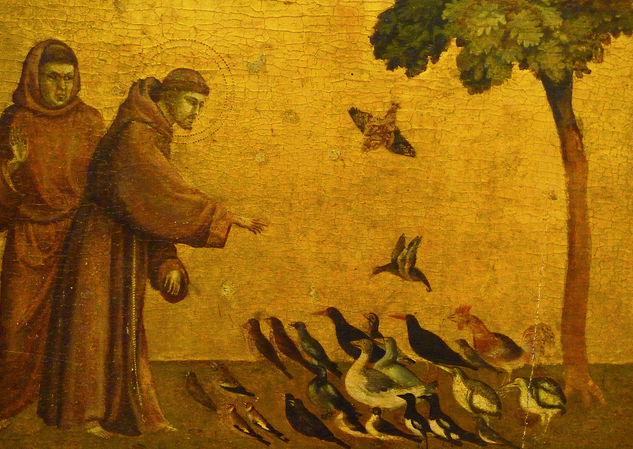
St Francis taught love and compassion for all of God’s creatures, and was fully aware that a soul was present within their outer forms, and that they were eternal and were loved by God:
A tool in your hands I am dear God, the sweetest instrument you have shaped my being into. What makes me now complete (is) feeling the soul of every creature against my heart. Does every creature have a soul? Surely they do; for everything God has touched will have life forever. And all creatures He has held.
If you have men who will exclude any of God’s creatures from the shelter of compassion and pity, you will have men who will deal likewise with their fellow men.
[St. Francis of Assisi]
St. Francis Preaches to the Birds
Many of the stories that surround the life of St. Francis deal with his love for animals. Perhaps the most famous incident that illustrates the Saint’s humility towards nature is recounted in the “Fioretti” or “Little Flowers,” – a collection of stories about his life. One day, while Francis was traveling with some companions, they happened upon a place in the road where birds filled the trees on either side. Francis told his companions to “wait for me while I go to preach to my sisters the birds.” The birds surrounded him, drawn by the power of his voice, and not one of them flew away. Francis spoke to them:
My sister birds, you owe much to God, and you must always and in everyplace give praise to Him; for He has given you freedom to wing through the sky and He has clothed you. You neither sow nor reap, and God feeds you and gives you rivers and fountains for your thirst, and mountains and valleys for shelter, and tall trees for your nests. And although you neither know how to spin or weave, God dresses you and your children – for the Creator loves you greatly and He blesses you abundantly. Therefore, always seek to praise God.
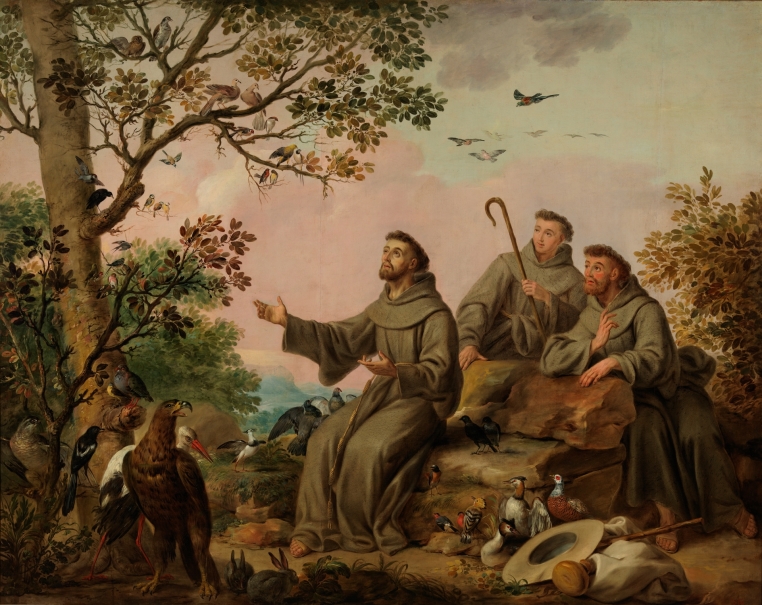
Francis was reverently in love with all natural phenomena – sun, moon, air, water, fire, flowers – because he saw everything in nature in relation to God, and felt love and compassion for all that lived. His tenderness for and his power over animals were noted again and again. From his companions we have the story of his rebuke to the noisy swallows which were disturbing his preaching at Alviano: “Little sister swallows, it is now my turn to speak; you have been talking enough all this time.” We hear also of the birds that perched attentively around when he told them to sing their Creator’s praises, of the rabbit that would not leave him at Lake Trasymene, and of the tamed wolf of Gubbio.
The Wolf of Gubbio
Another story from the Fioretti tells that in the city of Gubbio, where Francis lived for some time, was a wolf “terrifying and ferocious, who devoured men as well as animals.” Francis had compassion upon the townsfolk, and went up into the hills to find the wolf. Soon, fear of the animal had caused all his companions to flee, though the saint pressed on. When he found the wolf, he made the sign of the cross and commanded the wolf to come to him and hurt no one. Miraculously the wolf closed his jaws and lay down at the feet of St. Francis. “Brother Wolf, you do much harm in these parts and you have done great evil,” said Francis. “All these people accuse you and curse you. But brother wolf, I would like to make peace between you and the people.”
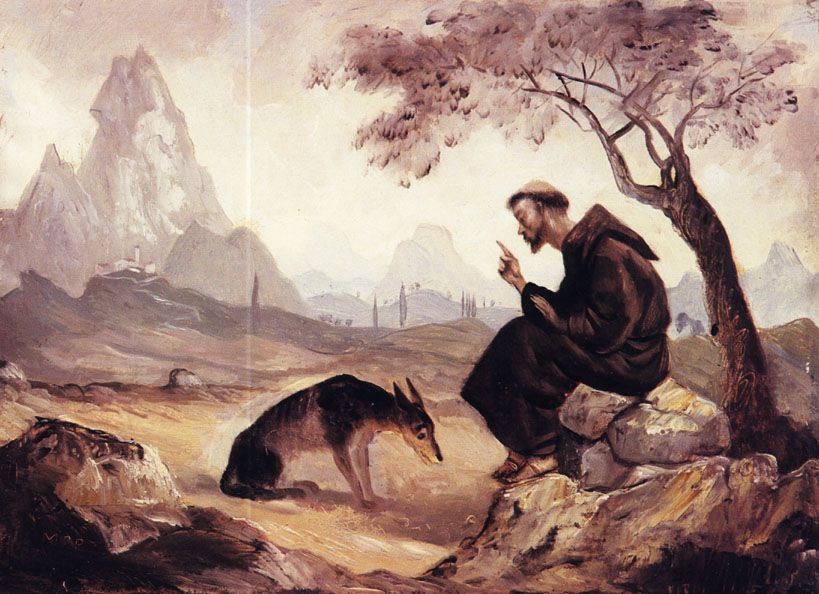
Then Francis led the wolf into the town and, surrounded by startled citizens, made a pact between them and the wolf. Because the wolf had “done evil out of hunger,” the townsfolk were to feed the wolf regularly, and in return, the wolf would no longer prey upon them or their flocks. In this manner Gubbio was freed from the menace of the predator. Francis, ever the lover of animals, even made a pact on behalf of the town dogs, that they would not bother the wolf again. It is also said that Francis, to show the townspeople that they would not be harmed, blessed the wolf.

[This is similar to the story of Narada Muni requesting the poisonous serpent not to harm the villagers. When Narada entered a nearby village, he found that the people were terrified by a large poisonous cobra which had killed a number of people. Narada Muni approached this cobra and gave him spiritual instructions. The cobra was so purified by the association of Narada Muni that Narada accepted him as a disciple, and at his initiation Narada Muni gave the cobra the instruction: “Don’t bite anyone.”
Having heard that the snake would no longer bite anyone, the village children started throwing sticks and stones at him as he slithered through town the next day. The snake returned to Narada Muni’s asrama that evening and complained about the children taunting him. Narada Muni then advised his disciple, saying, “I instructed you not to bite, but I didn’t tell you to give up your intelligence! If the children come near you again, simply expand your hood like you are going to bite and hiss menacingly – then they’ll be scared and run away!” Sometimes even the most peaceful person has to defend himself from the threats of others.]
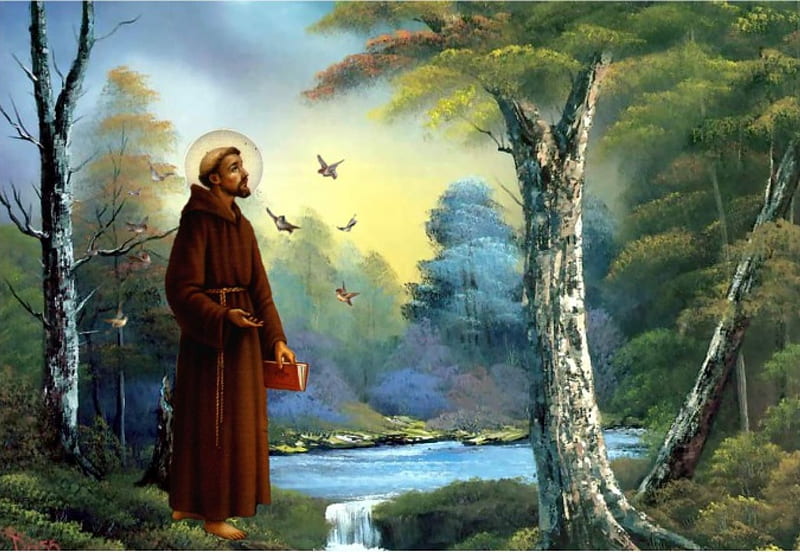
Part of Francis’ appreciation of the natural environment is expressed in his “Canticle of the Sun,” a poem written in Umbrian Italian around 1224 which expresses a love and appreciation of Brother Sun, Sister Moon, Mother Earth, Brother Fire, etc. and all of God’s creations personified in their fundamental forms. In “Canticle of the Creatures,” he wrote: “All praise to you, Oh Lord, for all these brother and sister creatures.” He preached to man and beast the universal ability and duty of all creatures to praise God and the duty of men to protect nature as both the stewards of God’s creation and as creatures ourselves.
Saint Francis and the Lamb
Francis was so overflowing with charity that he loved not only his fellow-men, but all his fellow creatures – birds, beasts, and even creeping things – for in each of them he perceived the handiwork of His Father, and, if he chanced to see anything suffering pain he, too, suffered with it. Once, when he was journeying with Brother Paul, he fell in with a goatherd amongst whose goats he noticed a lamb meekly skipping around and nibbling a little grass. “Look at that lamb,” he said to Brother Paul, “how like it is to Christ among the proud Pharisees! Let us, for love of him, purchase it and so deliver the gentle creature from the company of those goats.”
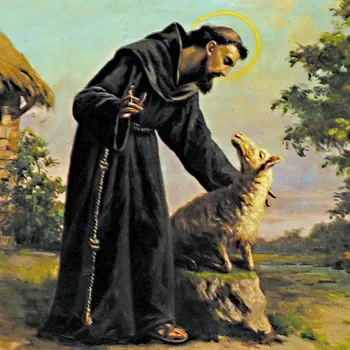
Brother Paul was much distressed to think that they had no money to offer the man, and nothing other than their poor habits [robes], all patched and ragged. As they were wondering what to do, they were overtaken by a merchant on his way to market. When he learned the cause of their grief, he paid the goatherd his price for it and after they had given thanks to God and to the merchant, they took the lamb and went on their way rejoicing. At Brother Paul’s suggestion, they sent the lamb to the “Poor Ladies” – later called the “Order of St. Clare” – a sister order to the Franciscans. It was tended with loving care, and in due time they made a habit from its wool and sent this to Francis, who received it with much joy and affection.
[“The Wisdom of St Francis and His Companions” p. 41-42]
Caring for the Larks, Oxen and Asses
The Friars often heard Francis say:
If I could speak to the Emperor I would beg and persuade him, for the love of God and for my sake, to make a special law forbidding anybody to catch our sisters the larks and kill them, or harm them in any way. Likewise all civic authorities and lords of castles and villages should be asked every year, on Christmas Day, to compel the people to scatter corn and other grains on the roads outside of towns and castles, so that our sisters the larks have enough to eat on that most solemn feast-day. And that out of reverence for the Son of God, who on that night was laid in the manger by the Blessed Virgin Mary between an ox and an ass, whoever owns an ox and ass should give them a good feed on that night.
[“The Wisdom of St Francis and His Companions” p. 62-63]
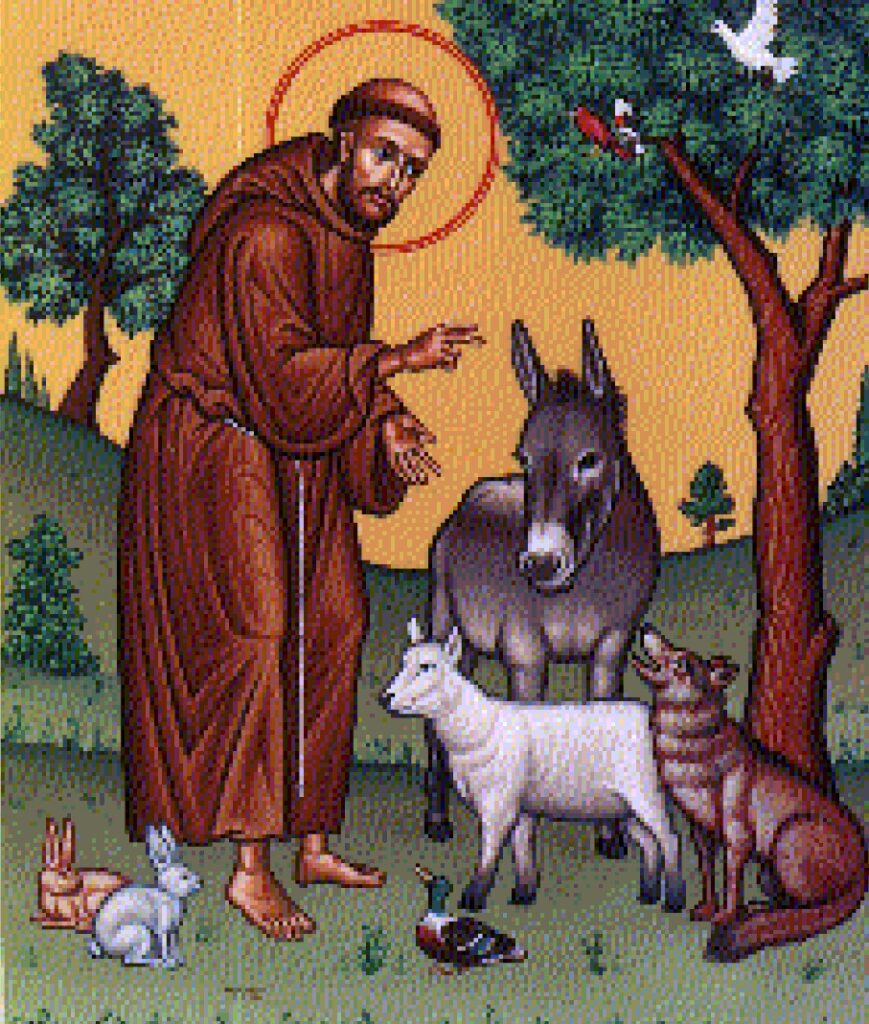
Rescuing Earthworms
Francis showed great tenderness for all of God’s creatures, however humble. Remembering the Psalmist’s words, “As for me, I am a worm and no man,” he would pick up any earthworms he found in his path and carry them to safety, so that passers-by would not tread them underfoot.
[“The Wisdom of St Francis and His Companions” p. 47]
Francis’ Humility
One day, when Francis was coming out of a wood where he had been praying, Brother Masseo went to meet him. Wishing to put his humility to the test, he said to him, affecting a jeering tone, “Why you, why you?” “What do you mean by that?” Francis asked him. “I mean, why should it be you all the world is running after, and why does everybody want to see you, listen to you and obey you? You are not handsome, nor very learned, nor of noble birth. Why, then, should all the world be running after you?”
When Francis heard this he rejoiced in the spirit and raising his face to heaven, he remained a long time with his mind uplifted to God. After a while, he fell on his knees and gave praise and thanks to God. Then he turned to Brother Masseo in great fervour of spirit and said:
You want to know why it should be me the world is running after? This is granted me because the eyes of the Most High God, which look upon the good and evil in every place, could not find among sinners anyone more vile, worthless and sinful than me, or any baser creature on earth for the marvelous work He intends to perform. So he has chosen me to confound the nobility, the greatness, the power, the beauty and the wisdom of the world. He has done this that men may understand that all virtue and all good proceeds from Him alone, and not from any creature.
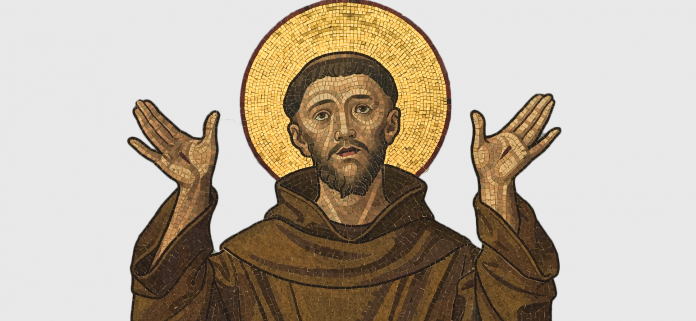
A peasant whom Francis met on his travels asked him: “Is it true that you are Brother Francis of Assisi?” On being told that this was so, he went on: “Then try always to be as good as folks say you are, so that they may not be disappointed in their expectations.” Francis immediately got down from the ass he was riding and prostrating himself before the peasant, thanked him for his advice.
Once when Francis was feeling ill and tired, he was obliged to continue his journey on a donkey. His companion, Brother Leonard, who came of noble stock, thought to himself as he trudged along: “My family would not even have dreamed of associating with Bernardone [Francis’ father], and here am I obliged to accompany his son on foot!” Francis, who knew what was passing in his companion’s heart, hastily dismounted and said: “Here, take my place. It is not at all fitting that you, who are of noble and powerful lineage, should walk whilst I ride.” Then Brother Leonard, put to shame by such humility, threw himself at the saint’s feet and begged his pardon.
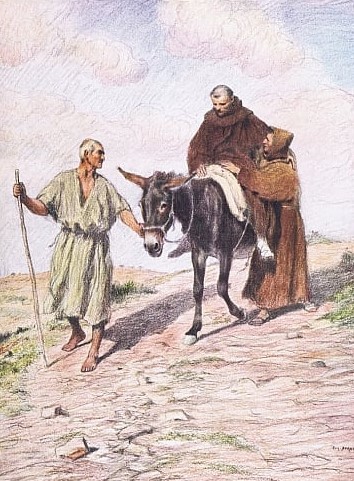
Wherever Francis found any writing, either sacred or secular, whether by the way, in a house or on the floor, he picked it up most reverently and placed it somewhere safe in case it contained the name of the Lord or something connected with it. One day, when one of the Brothers asked him why he so diligently picked up even writings of the pagans, and writings which made no mention of the name of the Lord, he gave this answer:
My son, it is because the letters are there of which the most glorious name of the Lord God is composed. The good that is in the writing belongs, moreover, not to the pagans, nor to any men, but to God alone, from whom all good comes.
[“The Wisdom of St Francis and His Companions” p. 49-50, 80, 84, 69]
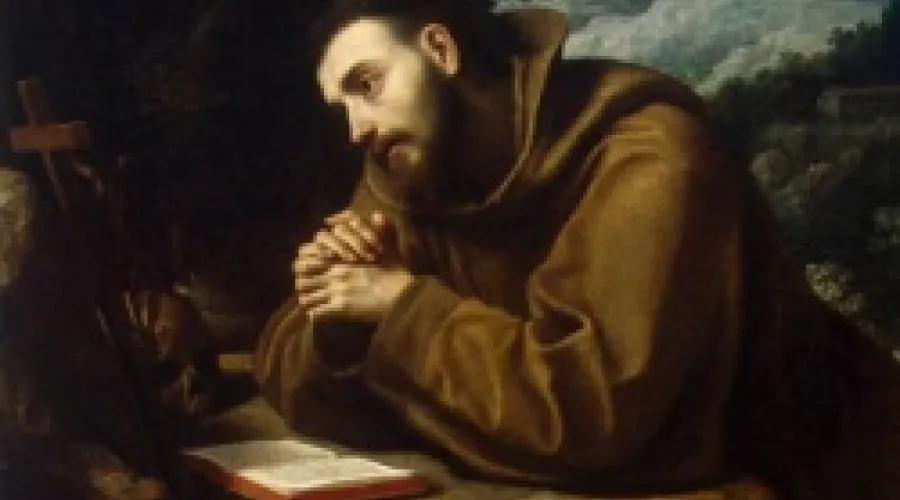
Humility: Giving all Honor to God
The people came to honor Francis so greatly on account of his holiness that they would kiss not only his hands but even his feet. Some friars were scandalized, and one of them rebuked him, saying: “Brother, aren’t you aware of what is happening? Don’t you see what they are doing? The people are worshiping you, and yet you don’t make any attempt to stop them, but seem rather to enjoy it!” But Francis was in no way put out and replied:
These people never do anything out of reverence for Him whom they ought to reverence!
This remark only horrified the friar still further. Then Francis said to him:
Look Brother, all this reverence which is paid to me I never take to myself, but simply pass it on to God. As for me, I keep in the dust of humility and give all honor to God. But the people benefit from it – it is God whom they are really worshiping, though they see Him only in His creatures.
[“The Wisdom of St Francis and His Companions” p. 86]
This is identical to the understanding and practice of great Vaisnava devotees.
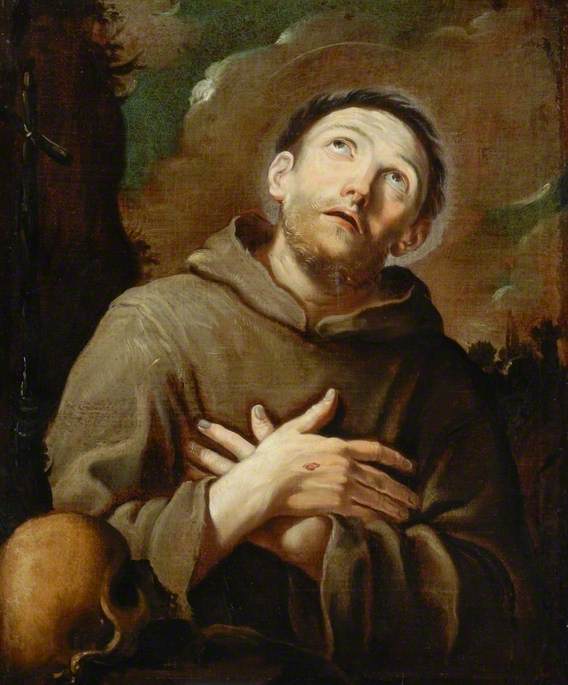
Learning and Humility
Francis was once told that at Paris the brothers had chosen as their Master a learned Professor of Theology who was greatly respected for his erudite scholarship by both clergy and laity. He said with a sigh:
I am afraid that such men will end by killing my little plant. The true Masters are those who set an example to their neighbors in good works and kindness. For a man is learned in so far as he works for others; he is wise in so far as he loves God and his neighbors; and he is a good preacher in so far as he knows how to do good works faithfully and humbly.
A very learned man once wanted to join the Order. When Francis asked the brothers for their opinion, they replied that they thought he would not make a good friar. Then one of them said, “Father, do you know what I propose? We should accept this man if he is willing to cook for us, but not otherwise.” The learned man was quite astonished at this proposal, but after considering the matter he told Francis that he was willing to be their cook. So Francis made him serve for a month in the kitchen, and when he saw how humbly he went about his duties, he ordered him to assume the office of Guardian and to preach.
Brother Giles was a simple man who felt no wish to preach. He used to accompany Francis and wait until he had finished preaching, when he would turn to the people and say: “What he says is true! Listen to him and do as he says.” This was his preaching.
[“The Wisdom of St Francis and His Companions” p. 53, 56-57, 39]

St. Francis and the Snowmen
At one time, Francis was overcome by his desire for a wife, family and home. He went out into the snow and made himself a snow wife. Seeing that he had a wife, Francis told himself, “Well, Francis, now that you have a wife you will certainly have some children!” So he made two snow sons and two snow daughters. Now that he had a whole household, Francis completed his new family by making two snow servants to help around the house. Then Francis became alarmed when he saw that he had seven people to care for. “Can’t you see your family is freezing to death,” he said to himself. “You had better go get some work so as to buy them proper clothes! And they are probably hungry – you must go and find them something to eat. And when will you have time to serve the Lord – Ah, forget about it!” In this way, Francis cured himself of his temptation.
[From: “Legenda major” (of St. Francis) chapter 5 – by Bonaventure]

The Body is Our Cell and Soul is the Hermit Dwelling Therein
Before sending them out on a mission, Francis addressed his friars in these words:
Even though you are on a journey, your conversation must be as humble and honest as though you were in a hermitage or your cell. For wherever we are and walk, our cell is always round us, because Brother Body is our cell, and the soul is the hermit dwelling therein, praying to God and meditating on Him.
[“The Wisdom of St Francis and His Companions” p. 71]
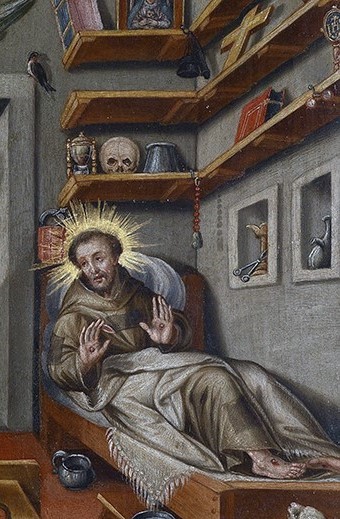
Francis has the Veins in his Eyes Cauterized
Francis suffered greatly from an infirmity of the eyes and was told by a physician that it could be relieved by having the veins cauterized. Whilst the iron was being heated, Francis desired to keep up his spirits by addressing the fire in these words:
My Brother Fire, noble and useful among all created things, be courteous to me now, for I have always loved you and shall continue to do so for the sake of Him who created you. I pray to our Creator who made you to temper your heat now, so that I can bear it.
And when he had said this, he made the sign of the cross over the fire. The brothers who were with him were so afraid to see his agony that all fled, and only the physician remained. When the cauterization had been done, they returned and Francis said:
Faint-hearts and men of little faith! Why did you run away? I tell you in truth that I felt no pain whatever, and no heat from the fire. And if it is not well done, let it be cauterized again!
[“The Wisdom of St Francis and His Companions” p. 86-87]
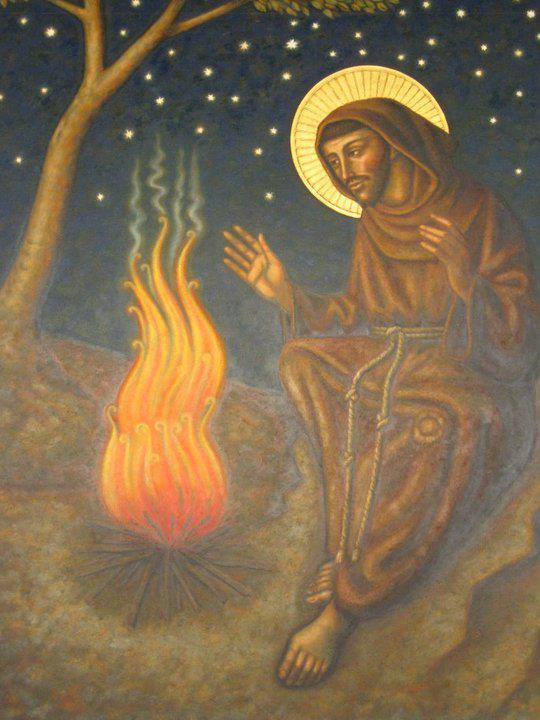
Beasts and birds alike were attracted to Francis’ gentle ways, entering into loving companionship with him – the hunted leveret [young hare] sought to attract his notice; the half-frozen bees crawled towards him in the winter to be fed; the wild falcon fluttered around him; the nightingale sang sweetly with him in the grove at the Carceri; and his “little brethren the birds” listened so devoutly to his sermon by the roadside near Bevagna that Francis chided himself for not having thought of preaching to them before. Francis loved all of nature, seeing it as the creation of God. He delighted to commune with the wild flowers, the crystal spring, and the friendly fire, and to greet the sun as it rose.
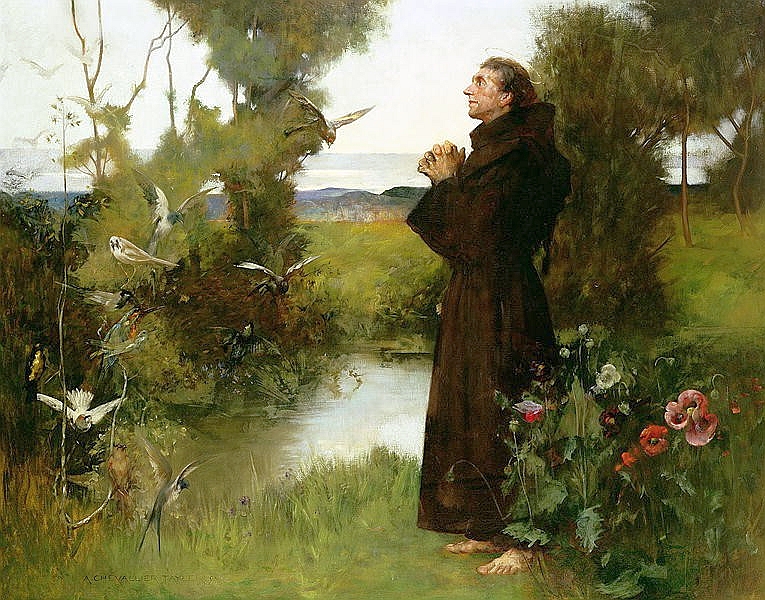
Srila Bhaktivedanta Swami on Saint Francis
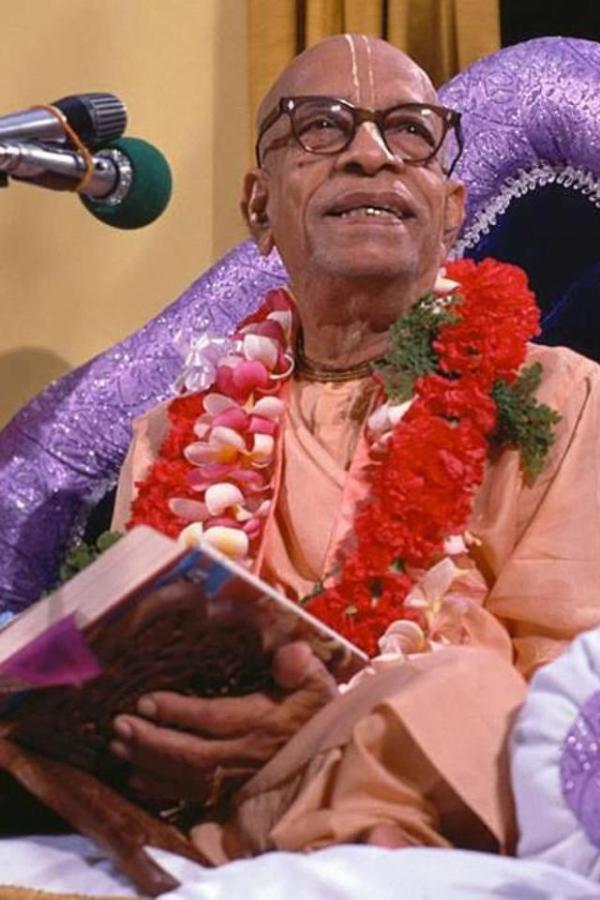
In 1974, Srila Bhaktivedanta Swami gave a class at a Franciscan Monastery in Melbourne, Australia. The following is an excerpt from that lecture:
Question: St. Francis, the founder of this particular order which we have been invited to speak to, found God in the material world. And he used to address the aspects of the material world as “brother” and “sister.” “Brother tree,” “sister water,” like that. What is your view upon this?
Srila Bhaktivedanta Swami:
This is real God consciousness, this is real God consciousness, yes, not that “I am God conscious, and I kill the animals.” That is not God conscious. To accept the trees, plants, lower animals, insignificant ants even, as brothers … Samah sarvesu bhutesu. This is explained in the Bhagavad-gita:
brahma-bhutah prasannatma
na socati na kanksati
samah sarvesu bhutesu
One who is thus transcendentally situated at once realizes the Supreme Brahman. He never laments nor desires to have anything; he is equally disposed to every living entity. In that state he attains pure devotional service unto Me.
[Bhagavad-gita 18:54]
“Samah” means equal to all living entities, to see the spirit soul, anyone – it doesn’t matter whether he is man or cat or dog or tree or ant or insect or big man. They are all parts and parcel of God. They are simply dressed differently. One has got the dress of tree; one has got the dress of king; one has got the, insect. That is also explained in the Bhagavad-gita. Panditah sama-darsinah: “One who is pandita, learned, his vision is equal.”
The humble sage, by virtue of true knowledge, sees with equal vision a learned and gentle brahmana, a cow, an elephant, a dog and a dog-eater (outcaste).
[Bhagavad-gita 5:18]

So if St. Francis was thinking like that, that is highest standard of spiritual understanding. Similar expression is there in the Caitanya-caritamrta, that sthavara-jangama dekhe na dekhe tara murti:
The maha-bhagavata, the advanced devotee, certainly sees everything mobile and immobile, but he does not exactly see their forms. Rather, everywhere he immediately sees manifest the form of the Supreme Lord.
[Caitanya-caritamrta Madhya 8:274]
A spiritually advanced devotee of the Lord, he sees the trees or the animals or the stone or anything he sees – he sees that it is the energy of God. Na dekhe tara murti. Just like your murti or my murti – murti means form – may be little different, but we are made of the same ingredients. If your body [is] surgically operated, the same blood, stone, or bone, or flesh, everything is there the same because same ingredients. Similarly, our outward covering is covered by these material elements, but inside, within this, there is the spirit soul. Therefore one who is advanced, he does not see that, “This is cat, this is dog, this is man, this is elephant, and this is brahmana, this is this …” No – he sees the soul, that, “Here is the soul, part and parcel of God.” That is his vision. Panditah sama-darsinah. So that is God realization. God is spirit, Supreme Spirit, and His part and parcel, the living entities. That is real vision. Panditah means learned.
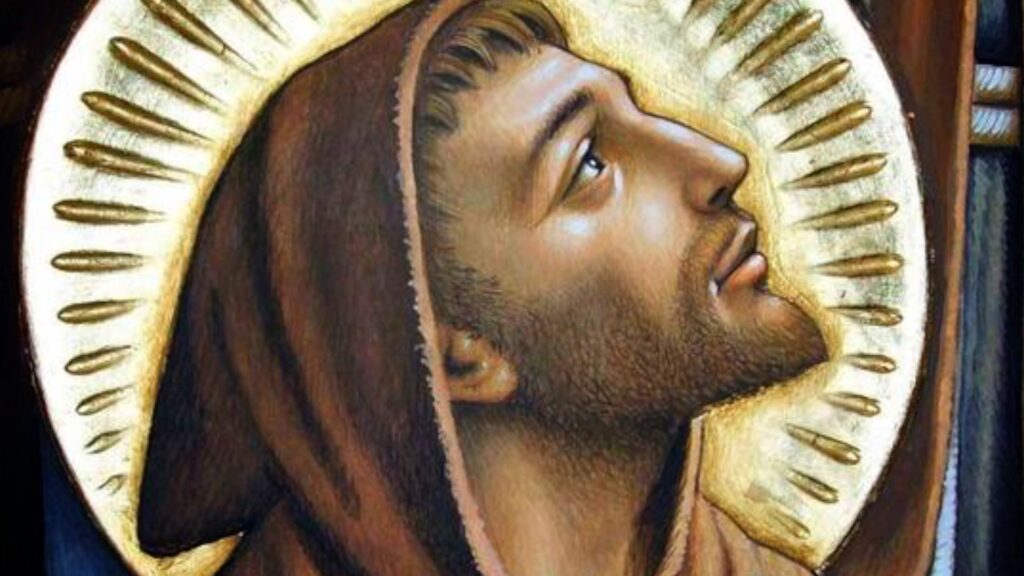
Saint Francis’ Prayer
LORD, make us instruments of Your peace.
Where there is hatred, let us sow love;
Where there is injury, pardon;
Where there is discord, union;
Where there is doubt, faith;
Where there is despair, hope;
Where there is darkness, light;
Where there is sadness, joy.O Divine Master, grant that we may not seek to much
to be consoled as to console;
to be understood as to understand;
to be loved as to love.For it is in giving that we receive;
it is in pardoning that we are pardoned;
and it is in dying that we are born to eternal life.


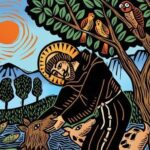
Leave A Reply